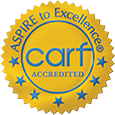When a person becomes dependent upon drugs or alcohol, their brain chemistry changes – namely the neurotransmitters affecting mood and pleasure, especially dopamine, serotonin, and norepinephrine. When a person is dependent upon a substance, he or she often has trouble finding pleasure in normal activities because of this alteration to the pleasure center in the brain. However, exercise can help to promote natural feelings of pleasure through the production of endorphins. These are natural hormones that create a similar high to opioids and are typically found to be depleted in the physiology of addicts. By replacing them through exercise, the brain can be brought back to balance, faster. Exercise benefits the brain in other ways as well. It promotes the formation of blood vessels, creates the connections between the cells, helps repair brain tissues, and generates new neurons, especially in the memory areas. It also improves how well a person can handle stress. Additionally, exercise can relieve minor feelings of depression, appease anxiety, and lift mood. It also promotes an overall feeling of well-being, increases self-esteem, and promotes a positive outlook. Exercise can also provide people with a physical outlet for certain feelings and emotions. All of these benefits help to reduce many of the common triggers that lead to substance abuse and relapse.
Exercise can also be beneficial as a new hobby, providing many opportunities for healthy social engagement. When a person is going through recovery he or she cannot be involved in many of the relationships and activities previously enjoyed. In order to avoid the temptation and triggers to use, he or she needs to find new ways to spend their time. Exercise, especially training for something such as a 5K or marathon, provides a way to focus time and energy. Gyms and fitness clubs can provide a new place to meet friends and socialize without drugs and alcohol. Exercise can also help to promote physical health. Many people overcoming drug or alcohol abuse are also dealing with medical complications due to their self-abuse, and exercise can help the body heal.
Process groups are loosely structured. Some may have a specific theme, but they will not have a detailed agenda. A member can discuss pressing issues, and others can impart feedback, advice, or support. This forum provides an opportunity for individuals to learn an outside perspective on an issue by someone going through a similar experience. Process groups focus on the cultivation of self-acceptance and self-support rather than critique or excessive advice-giving. Many addicts have developed interpersonal issues and problems relating with others. Process groups often highlight and/or reveal these troublesome interpersonal issues and social difficulties. But by learning and recognizing these problems in a safe and non-judgmental environment, a client can work on finding and practicing healthier alternatives. Growth is facilitated by having a designated place to express oneself without fear of rejection. Many of the issues leading to addiction begins with the suppression of thoughts, feelings, and emotions. Learning to express one’s feelings in a self-respecting and constructive way is essential to long-term recovery.
At Pax House, we provide the opportunity for our clients to engage in process groups. During these group sessions, clients have an opportunity to share their thoughts and feelings about their addiction, recovery journey, or other life concerns with the others in the group. They receive supportive feedback from others, learn to express themselves, and build healthy interpersonal relationships. We feel that process groups are an essential social and emotional component of recovery from drug and alcohol addiction. In the self-awareness that often develops through them, clients find themselves better able to cope with what were previously insurmountable stressors in their lives. Our process groups are gender-specific to reduce some of the complications that co-ed interpersonal discussions or interactions can cause. Some of our clients may have experienced sexual abuse or other trauma that makes them uneasy discussing or sharing those experiences with those of the opposite gender, and there are other issues that sometimes make co-ed groups more restrictive than constructive. While some process groups will focus on a theme, such as trauma, the primary focus of most of our process groups is to provide a safe space for our clients to undergo personal exploration and benefit from outside perspectives.

